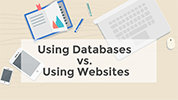While you may want to automatically use a website to find information for your research paper, it may not be the best resource for your needs. Easier is not always better in the long run.
Using Databases:
- Databases are available to students through the Library’s subscription. They are accessible on campus and at home.
- Because they are paid for, you need to log-in when home so the database knows you are authorized to use it.
- Databases are often confusing for students at first.
- Many have complicated search screens which students may find intimidating.
- Though many allow for natural language, they often work best with scholarly keywords.
- The best resources for finding in-depth information for a research paper or project are databases.
- Journal articles, written by experts in the field, are found there.
- See our resource on Popular vs. Scholarly for more information.
- Journal articles from databases are subjected to peer-review, which means other professionals in the field verify the information in the articles is accurate.
- See Anatomy of a Scholarly Article for more information.
- There is a finite number of journal articles in a database.
- You can narrow down your selections by date published, country, type of article, full-text or even what types of subjects appeared in a study.
Using Websites:
- The Internet is “free” in terms of cost for use.
- The cost for access is paid through service providers and device manufacturers.
- Your usage and personal information may be bought or sold by companies in exchange for access.
- See website domains for more information.
- Websites are found fairly easily through a search engine like Google or Bing.
- They are able to take whatever you type in and produce a result in less than a second.
- If you are looking for quick or background information, websites may provide ideas for topic selection or keywords to use in databases.
- Any person or organization can create a website.
- There is no authority overseeing the web to verify if information is factual or not.
- Unfortunately, this causes false information to spread quickly.
- See evaluating information for more information.
- There is an unlimited amount of websites.
- The order of website results are often determined by:
- Your past searches.
- Money paid to companies that operate search engines.
- Tags on a website.
- The order of website results are often determined by:


